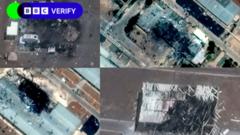The head of the IAEA, Rafael Grossi, reported that no additional damage has occurred at Iran's nuclear sites, specifically Natanz and Isfahan, since Israeli airstrikes. Despite the destruction of above-ground facilities, the underground segments remain intact, with ongoing concerns about Iran's nuclear ambitions and the wider implications of military escalation.
IAEA Reports No Further Damage to Iran’s Nuclear Facilities Following Israeli Strikes

IAEA Reports No Further Damage to Iran’s Nuclear Facilities Following Israeli Strikes
International Atomic Energy Agency confirms stability in Iran's nuclear sites after recent attacks, amid escalating tensions.
The head of the International Atomic Energy Agency (IAEA), Rafael Grossi, has indicated that Iran's nuclear facilities have not sustained further damage following a series of Israeli airstrikes. In a report to the IAEA's board of governors in Vienna, Grossi confirmed that while an above-ground enrichment facility at Natanz was destroyed, the underground facility was unharmed.
Israel conducted the attacks to curtail Iran's nuclear progression, claiming it took out vital components of the nuclear program, including the deaths of nine Iranian nuclear experts. These actions were framed as a preventative measure against Iran's plans to weaponize its uranium stockpile, which has dual uses for energy and nuclear weapons.
Iran maintains that its nuclear endeavors are entirely peaceful. In a strong response to the Israeli attacks, Iranian officials urged the IAEA's member states to denounce the strikes, emphasizing a commitment to adhering to international regulations.
Grossi, during Monday's briefing, stated that the IAEA has been closely monitoring Iran’s nuclear developments, evaluating the condition and radiation levels at various facilities through dialogue with local authorities. He specified the destruction at Natanz concerning the Pilot Fuel Enrichment Plant (PFEP), which housed centrifuges enriching uranium close to weapons-grade purity.
The strikes also caused damage to the Isfahan Nuclear Technology Centre, where a reactor fuel manufacturing plant and a uranium conversion facility were compromised, although offsite radiation levels have remained stable.
The Israeli military had previously asserted that the attacks would render Iran's capacity to produce metallic uranium ineffective. However, subsequent reports claiming limited damage to the Fordo enrichment site have not been substantiated by military confirmations from Israel.
Grossi noted that, despite the reported radiological and chemical contamination at the targeted sites, external radiation levels are unchanged. He called for all involved parties to exercise restraint, warning of the potential for severe consequences to both people and the environment due to military escalation.
Iran’s Foreign Minister condemned the Israeli strikes as violations of international law, asserting the country’s missile responses were necessary retributions for such aggression. Meanwhile, the Israeli military has vowed to continue its operations aimed at diminishing the perceived threat from Iran’s nuclear aspirations, amid rising casualties reported on both sides since the escalations began.
In a broader context, the IAEA recently declared Iran in breach of its non-proliferation commitments, further complicating the political landscape surrounding its nuclear activities. This situation follows the United States' withdrawal from the 2015 nuclear agreement, leading Iran to exceed previously agreed-upon uranium enrichment limits.























